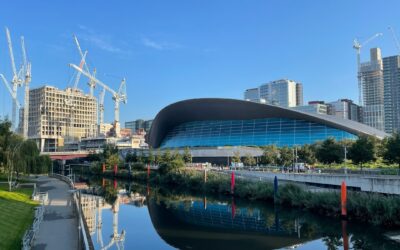Oxford heat network secures £21 million • UK's largest fifth generation heat network launched • Enfield connects schools to heat network • Read more about the developments in sustainable heating and cooling in this month's news update from the UK
The city of Oxford has taken a major step forward in its mission to reach net zero by 2040, with a £21 million investment from the UK Government’s Green Network Fund to support the development of a new low-carbon heat network. The funding will enable the rollout of the Oxford Energy Network, a project led by energy company 1Energy, which aims to install a 22 km district heating network across the city.
The network is expected to become operational by 2030 and will source most of its energy, up to 80%, from low-carbon sources including air source, water source, and data centre heat pumps. While gas may be used as a backup during maintenance or extreme weather, the system is designed to be predominantly renewable.
With buildings responsible for an estimated 60% of Oxford’s carbon emissions, local leaders have identified district heat networks as a critical measure to reduce the city’s environmental footprint. Oxford City Council, Oxford University, and Oxford Brookes University will all connect to the network, providing a significant anchor load to the system.
While full planning details are expected within the next 6–9 months, the announcement has already positioned Oxford as a leading example of how heritage-rich, high density, city centres can successfully decarbonise.
In a landmark move for sustainable heating in the UK, Welborne Garden Village in Hampshire is now home to the country’s largest water-source heat network, designed to deliver clean, low-carbon heating and cooling to 6.000 homes within the new community. The innovative project helps meeting net-zero targets and future-proofing developments in line with the UK’s Future Homes Standard.
Developed by Rendesco in partnership with Last Mile Heat, the first phase of the network has already connected 700 homes, alongside commercial and community buildings. As the garden village expands, the system is expected to provide reliable heating, hot water, and cooling to more than 15.000 residents, with all 6.000 homes due to benefit.
Unlike conventional heating systems, the network draws heat from Portsmouth Water’s underground Hoads Hill Reservoir. This allows it to achieve superior efficiency levels compared to air source heat pumps, as reservoir water maintains a higher and more consistent temperature year-round. As a result, the system cuts carbon emissions by up to 90% when compared with traditional gas boilers and by 50% compared to standard air-source solutions.
As gas boilers face phase-out under upcoming building regulations, Welborne is setting a new standard for sustainable heating in the UK.
Red more in article from ARC Journal
Enfield Council has taken a major step toward decarbonising public buildings with the announcement of £18.6 million in government funding to connect eight local schools to its heat network. The grant, awarded by the Department for Energy Security and Net Zero, will enable the council’s energy company, Energetik, to replace aging gas boiler systems with connections to the local heat network.
The initiative will see Oasis Academy, Heron Hall Academy, Capital City College, Waverley School, Edmonton County School, Winchmore School, and St John and St James School integrated into Energetik’s expanding network. Around 12 kilometres of new pipework will be laid to facilitate the connections, with full operations planned for 2028.
In addition to the Government grant, Enfield Council has approved an additional £1.6 million capital loan to support Energetik’s delivery of the project, alongside £761.000 from the schools’ capital budget.
The district heating system sources waste heat from the nearby Edmonton incinerator and other energy facilities, redirecting it into homes, schools, and businesses through a 23km pipe network. Once completed, this infrastructure is expected to significantly reduce carbon emissions, cut local air pollution, and provide long-term operational cost savings.
Read more in article from Enfield Dispatch
To stay updated on news for sustainable heating and cooling, follow us on LinkedIn, and subscribe to our Newsletter.
Sweden is at the forefront of decentralised heat networks technology. Our aim for “Sustainable Heating & Cooling by Sweden” is to facilitate knowledge sharing between British, French and Swedish stakeholders and develop and encourage environmental and economic best practice.
To find out how we can help you and your organisation, please contact our London or Paris-based “SHC” teams. We can introduce you to leading consultants, suppliers of technology and services who will be pleased to share know-how of the development of sustainable heating & cooling solutions.


